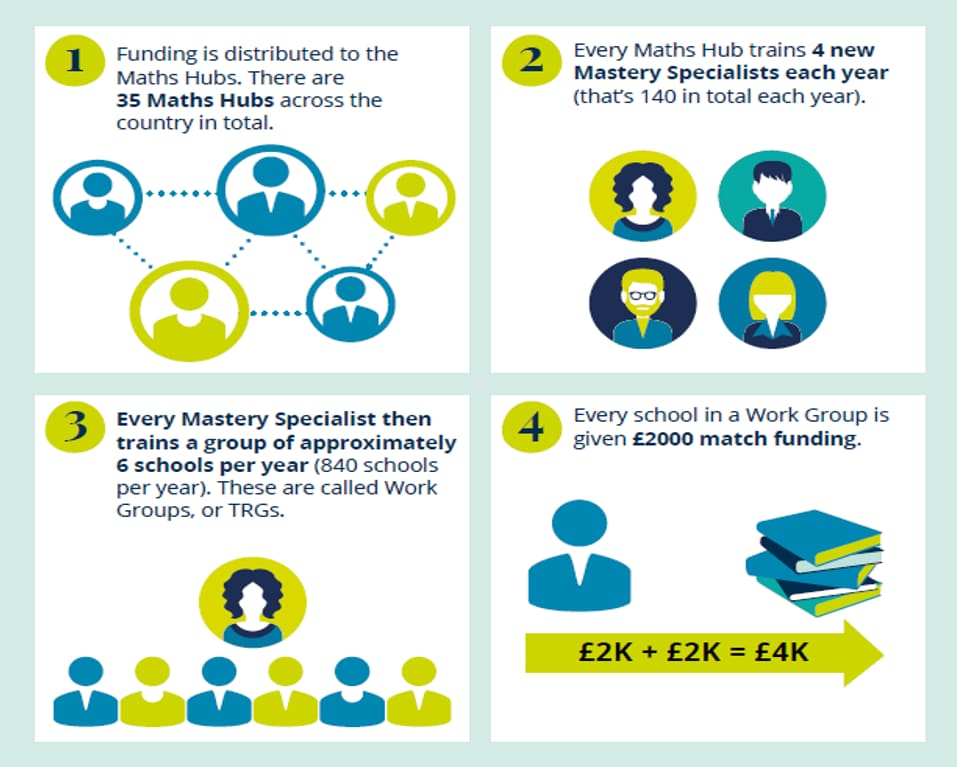Improving outcomes for primary pupils through maths mastery

Last year, Nick Gibb (the Schools Minister) announced that the mastery approach to teaching maths is set to become a standard fixture in England’s primary schools.
With the help of up to £41 million in funding from the Department for Education (DfE), more than 8,000 primary schools (half of the total number in England) will receive support to adopt the approach, which is used by some of the leading performers in maths in the world, including Shanghai, Singapore and Hong Kong. A few months on and we’ve learned a little more about how this funding will be distributed...
Why the mastery approach?
The Government has high aspirations for primary mathematics in England, and wants to ensure children are equipped with the knowledge and skills they need to succeed. They cite international tests which show that South Asian countries lead in mathematics - and want to learn from these high performing jurisdictions to help England improve their international ranking.
What is the mastery approach?
There have been many definitions of mastery, and the term is being used in multiple ways within the raising standards conversation. At the heart of teaching for mastery is high aspirations for everyone. It’s the belief that by nurturing positive attitudes and building confidence in mathematics, a deep and sustainable learning is achievable for all children.
Teachers following a mastery approach plan carefully, ensuring that no pupil’s understanding is left to chance. Children are taught together, as a whole class, and teaching is supported by high-quality resources - commonly a textbook in South Asia. Although referred to as a textbook, this is what we in the UK have come to know as a high quality workbook (which children can write into). As well as providing opportunities for practice, these resources often show the methods that children need to learn and present the flow of the lesson coherently to children.
How will schools receive funding?
Funding will be cascaded over the next few years by the The National Centre for Excellence in the Teaching of Mathematics (NCETM).
The majority of this funding will pay for primary teachers to be trained as Mastery Specialists, as part of the NCETM coordinated Maths Hubs programme. 140 Mastery Specialists have been trained so far, and another 140 embarked on their training in September last year. A further 140 Mastery Specialists will be trained each year for the next 4 years. Each Mastery Specialist will lead a Work Group (also referred to as a Teacher Research Group, or a TRG) consisting of 6 schools - and there will be funding for teachers and schools to join these Work Groups.
In addition to providing funding for training, schools participating in these Work Groups will receive up to £2000 match funding to invest in high-quality mastery resources. A brand new list of approved textbook resources will be released every year for the new cohorts of funded TRGs. TRGs will need to select textbooks on that list to be eligible to claim their matched funding. Whilst the Maths Hubs have been trialling some textbook resources in Primary schools, these resources are not endorsed and no materials are currently available for funding.

How can my school be involved?
Teachers and schools for the 2016/2017 programme have been selected, and details of how schools and teachers can get involved in 2017/2018 can be found via your local Maths Hub.
What does Pearson Primary think?
We are really excited about the DfE’s announcement and we’re pleased to see that the Government are committed to raising standards in primary mathematics. We are dedicated to improving the confidence of teachers and children so that mastery in mathematics becomes a reality for all children.
High quality textbooks are one part of a teacher’s toolkit, but we know that teachers value other high quality teaching tools and resources too which help save time which can then be invested into making a difference in the classroom.
There are valuable lessons that we can learn from South Asia, but it’s important that we don’t forget the learning we have built up locally about what works in the UK. We are in ongoing conversations with the DfE about how we can continue to support improved educational outcomes for all children.
For FREE support, tips and advice:
Visit our Teaching for Mastery hub:
- For a link to a recording and FAQ sheet on
‘Teaching for mastery in maths in my school: Keeping the whole class together’. - For information on how to register your interest in free maths mastery workshops that we’re running this term.
- For links to useful mastery articles from NRICH, NCETM – and more.
- For information on free mastery events being run by The Hamilton Trust.
For resources to support you to teach for mastery:
Looking for a maths programme to support you in teaching for mastery?
Find out about Power Maths (coming 2017) and Abacus at teaching for mastery in maths.